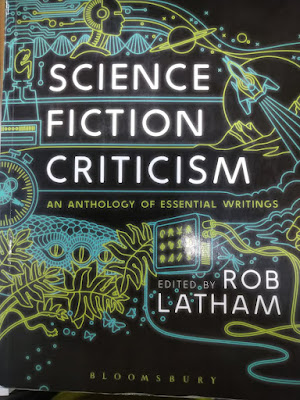閱讀版本:pp. 22-36 in Rob Latham (ed.), Science Fiction Criticism (London: Bloomsbury Academic, 2017)
原刊於:Extrapolation (1966) 最早的科幻主題學術期刊(1959/12-now)
Judith Merril 是 the Futurians 出身(1938-1945 活躍於紐約的科幻迷團體,包含 Asimov、Frederik Pohl、James Blish 在內等美東大咖匯集於此)。雖然具有作家身分,但她對科幻的最大功績在於編輯和評論。她是行內首創編纂年度科幻選的大編輯,而且取材不限於科幻雜誌,也因此擴展了科幻的疆界與眼界。她也是北美倡導 new wave 的第一人。她在 The Magazine of Fantasy and Science Fiction 雜誌的書評專欄(1965/05~1969/05)倡議以 ”speculative fiction” 取代 “science fiction”。本文則是刊載在學術刊物的論文。由於還是行內人寫的論文,學術氣息並不重,也代表科幻學術研究其實有尊重行內的傳統(大概也要看刊物,Science Fiction Studies 學術味就頗重)。
由於這裡由 Merril 賦與的定義基本上就是現行 “speculative fiction” 的解釋,所以本篇的重要性也不言可喻。只是大多數人閱讀本篇,還是著重於我做筆記的這兩頁。畢竟前面 Merril 從科學史和文學史拉哩拉雜講了何謂科幻,何謂小說,在中間賦與定義後,後面則是她觀點下的科幻發展史。由於治史先看立場立論,所以對我而言後面就可以不用再記。
筆記開始:
p.26
I cannot define science fiction, but I can locate it, philosophically and historically:
There is a body of writing of whose general outlines the readers of Extrapolation are, by common consent, already aware: that is to say, the “classical antecedents” from Lucian and Plato through, approximately, Kepler and de Bergerac: the “borderline” (both of acceptability and between periods) instances of Don Quixote and Robinson Crusoe, terminating probably (in general acceptability) with Gulliver’s Travels and Micromegas; the “Gothic” vein which characterizes the first half, or two-thirds, of the nineteenth century, and continues as a major element well into the twentieth; the period generally considered as “modern,” beginning with Verne, and achieving general popularity in the last two decades of the nineteenth century; and the specific area of American specialty science fiction starting in the pulp adventure magazines of the 1910s, and being consolidated by Hugo Gernsback as a discrete phenomenon in his specialty publications during the 1920s. 先來一段 proto sf 史
Assuming this to represent some general area of agreement on what we mean when we talk about “science fiction,” (尋求讀者共識,並呼應 Damon Knight 的著名科幻定義:”Science fiction is what we point to when we say it.”)I believe it is possible to distinguish within the broad area certain distinct and more reasonably definable forms:
1. “Teaching stories”: the dramatized essay or disguised treatise, in which the fiction from is utilized to present a new scientific idea, sometimes (as with the Somnium, or the works of “John Taine” and other pseudonymous scientists) because of social, political, religious, or academic pressures operating against a direct presentation; sometimes (as with the typical Gernsbackian story, and a fair proportion of late nineteenth century work) as a means of “popularizing” scientific information or theories, or (hopefully) sugarcoating an educational pill. (科幻推廣科學,i.e. 科科)(This is what used to be called by literary snobs, “pseudoscience,” and should have been called “pseudofiction” – although in the hands of an expert it can become reasonably good fiction: Arthur C. Clarke
p.27
manages it occasionally, although his best work—Childhood’s End, for instance—is not of this type.)(所以總舵主當年似乎用錯科科,不過我傾向相信總舵主當時對Clarke的認識只有這一本和2001系列)
2. “Preaching stories”: primarily allegories and satires—morally pieces, prophecies, visions, and warnings, more concerned with the conduct of human society than with its techniques. These are the true “pseudoscience” stories: they utilize science (or technology), or a plausible semblance of science (or technology), or at least the language and atmosphere, in just the same way that the scientific treatise in disguise utilizes fiction. And let me point out again (rather more enthusiastically than before) that some first-rate writing has emerged from this sort of forced marriage. (Perhaps the difference between the work of a marriage broker and a shotgun wedding?) Stapledon’s Starmaker falls into this group, as well as Ray Bradbury’s (specifically) science fiction and a large proportion of both Utopian and anti-Utopian novels up through the turn of the century.
3. “Speculative fiction”: stories whose objective is to explore, to discover, to learn, by means of projection, extrapolation, analogue, hypothesis-and-paper-experimentation, something about the nature of the universe, of man, of “reality.” Obviously, all fiction worth considering is “speculative” in the sense that it endeavors to reach, or to expose, some aspect of Truth. But it is equally true—and irrelevant—to say that all fiction is imaginative or all fiction is fantasy. 重點來了 I use to term “speculative fiction” here specifically to describe the mode which makes use of the traditional “scientific method” (observation, hypothesis, experimentation) to examine some postulated approximation of reality, by introducing a given set of changes—imaginary or inventive—into the common background of “known fact,” creating an environment in which the responses and perceptions of the characters will reveal something about the inventions, the characters, or both.
It is in this last area that the essence of science fiction resides; it covers a great deal of territory, shading at either end into the first two categories. Clearly there is hybridization all through the groups—as for instance in satire (such as The Child Buyer, or Player Piano) whose main devil actually is some specific aspect of science or technology.
For purposes of this discussion, I am not considering the space adventure story, the transplanted western or historical, as science fiction at all. 所以 Merril 的定義還是含有價值觀與優劣偏好的。
整個看下來,其實
Margaret Atwood 版的 speculative fiction 或許符合 Heinlein 版或 Merril 版的若干符節,但感覺就是不太對,總是多了不少主流優越感。所以就想到了這張圖。這張圖的出處是
Darko Suvin, Positions and Presuppositions in Science
Fiction (Kent, Ohio: The Kent State University Press, 1988) 的 p. 69,篇名:”Narrative Logic,
Ideological Domination, and the Range of SF: A Hypothesis” (1982)。Suvin 的標準很高,把 Good SF 畫得那麼小一塊(對照我的量尺大概四星吧
X-D),不過拿必勝客披薩做比喻,好歹除了芝心餅皮以外,其他好壞不論都可以算是科幻。然而,Atwood 給人的感覺就像是只有她寫的
“speculative fiction” 放在圖中的 Good SF+Optimum,其他「爛貨」就只是
“science fiction”。這麼一來,science fiction
行內人當然就不爽了。


No comments:
Post a Comment